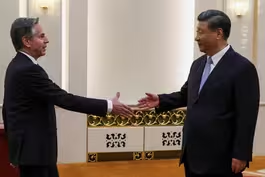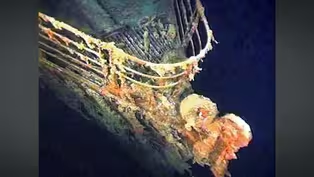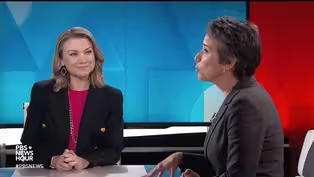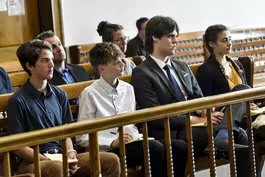
Report: DOJ resisted investigating Trump's role in Jan. 6
Clip: 6/19/2023 | 7m 10sVideo has Closed Captions
Report says DOJ resisted investigating Trump's role in Jan. 6 for over a year
New reporting from The Washington Post reveals that in the days and weeks following the Jan. 6 attack, senior officials at the Justice Department and the FBI made critical decisions that might have compromised its investigation of former President Trump and his associates' possible involvement in the historic event. Geoff Bennett discussed the report with Aaron C. Davis.
Problems playing video? | Closed Captioning Feedback
Problems playing video? | Closed Captioning Feedback
Major corporate funding for the PBS News Hour is provided by BDO, BNSF, Consumer Cellular, American Cruise Lines, and Raymond James. Funding for the PBS NewsHour Weekend is provided by...

Report: DOJ resisted investigating Trump's role in Jan. 6
Clip: 6/19/2023 | 7m 10sVideo has Closed Captions
New reporting from The Washington Post reveals that in the days and weeks following the Jan. 6 attack, senior officials at the Justice Department and the FBI made critical decisions that might have compromised its investigation of former President Trump and his associates' possible involvement in the historic event. Geoff Bennett discussed the report with Aaron C. Davis.
Problems playing video? | Closed Captioning Feedback
How to Watch PBS News Hour
PBS News Hour is available to stream on pbs.org and the free PBS App, available on iPhone, Apple TV, Android TV, Android smartphones, Amazon Fire TV, Amazon Fire Tablet, Roku, Samsung Smart TV, and Vizio.
Providing Support for PBS.org
Learn Moreabout PBS online sponsorshipGEOFF BENNETT: The U.S. Department of Justice initially resisted opening an investigation into former President Donald Trump and his associates' role in January 6 and efforts to overturn the 2020 election.
That's according to exclusive investigative reporting by The Washington Post.
It took nearly a year after the Capitol attack for a DOJ inquiry to begin, and the FBI only opened its investigation into the fake electors plot in April 2022.
Aaron Davis is one of the reporters who broke this story, and he joins me now.
Thanks for being with us.
AARON DAVIS, The Washington Post: Thanks for having me.
GEOFF BENNETT: So, two days after the Capitol attack, the FBI started announcing charges against some of the rioters, the so-called foot soldiers.
What accounts for the DOJ's much slower, more cautious approach in investigating Donald Trump and his allies?
AARON DAVIS: We found that the FBI was very gung-ho, ready to go out and get those who had broken into the Capitol, the people who were on TV that day breaking the windows, going inside, threatening lawmakers.
But they were much more hesitant to go after the -- all the incidents, the episodes, the activities that took -- that fomented the sentiment that led to that rage on that day.
They were wanting to seek a direct connection between the violence and somebody via phone record or something else to be -- to launch that investigation.
You have to realize is this is an FBI that was twice stung with the investigation into Russian interference with the Trump election in 2016 and, before that, James Comey's decision to open -- reopen an investigation into Hillary Clinton.
And this was the third time, if you will, the FBI stepping into the breach to investigate a president or presidential candidate.
And they really wanted solid evidence.
They wanted something they could touch and feel.
This, we can hold on to.
We can show this is why we're investigating Donald Trump.
GEOFF BENNETT: In this piece reported by you and Carol Leonnig, you quote a former Justice official, who says of the current DOJ: "You can work so hard not to be a partisan that you're failing to do your job."
How widely held a view was that within the DOJ, that the Garland DOJ was, in many ways, overcorrecting for the perceived ethical failures of the Barr DOJ?
AARON DAVIS: There was a huge culture shift.
In Garland's own words, this was to try to get back to regular order.
Under Bill Barr, there were many times that the attorney general said, this is a valid investigation, this is not a valid investigation.
The attorney general, Garland, wanted to come in and say, I'm not going to make those decisions.
These should bubble up to me from the bottom through evidence.
The problem was, there was such a culture that had been effected by -- under the previous administration, where it was hard to go up the chain.
There wasn't the mechanism to go up and try to make these cases.
And very early on, even before Garland came in, there was an attempt to investigate Trump's orbit.
And it was batted down in the very early weeks after January 6, saying it's premature to do that.
Let's build up from the evidence and get there.
The problem was, at some point in time in this investigation, they realized there was no connection between the people entering the Capitol and the people who had done some of the fake electors and more of the conspiracy type of work leading up to January 6.
As we quote in the story, there was no ladder to get from here to there to get to those other potential investigations.
GEOFF BENNETT: Well, take us inside the decision by the DOJ to pursue the rarely charged seditious conspiracy against the militia, the militiamen who were involved in January 6.
AARON DAVIS: This is interesting, because this was a big part of the whole idea of, if you think about it, investigating January 6 like a organized crime-type syndicate, that you had your foot soldiers who went in the Capitol, and somewhere up there, there might have been an architect who designed and put this all in play.
And so if you get those rioters and you get their phones, and you go up and you keep going up, the seditious conspiracy, the Oath Keepers, the Proud Boys who were a big part of that were considered the linchpin in that whole effort.
And so if you could charge them with seditious conspiracy, that's -- that carries potentially decades in prison.
Maybe they will actually be motivated then to tell you what they know about the planning.
The problem was, that took so long.
It took like months to -- it was first brought up as early as February, but it took until November to actually have a draft prosecution memo where they were debating it.
And it took many more weeks for senior Justice Department officials to actually agree on what should be charged and who should be charged.
And then, when they finally got and arrested, like, Stewart Rhodes and Oath Keepers in January, they realized these folks were not going to turn or be able to flip on someone.
They just didn't have that view of what had really been going on inside the White House.
GEOFF BENNETT: So what then prompted the pivot within DOJ?
AARON DAVIS: You know, that is a good question.
We asked it many times: What changed in your world view?
Because so much of the evidence that, ultimately, they began investigating, of course, with fake electors had been bubbling out in the public over the course of the whole year.
There were identical versions of the fake elector documents that were obtained under the Freedom of Information Act in March 2021, just two months after the attack.
John Eastman and the memo about using fake electors had been out there for weeks at the time that they finally did in November.
They're also -- you can't deny that there was a lot of pressure put on DOJ by the House Select Committee and what they were turning up, by the wave of opprobrium from critics around the country.
And there just was, at that point in time, finally a little bit of breathing room inside the Department of Justice, inside particularly the U.S. attorney's office, where they're now putting Oath Keepers and Proud Boys, and those are getting ready for trial.
And they said, we still need to look at these other areas of investigation that we have.
They brought him in an investigator named Tom Windom.
He went to the FBI and said: Will you help me investigate the fake electors?
And even then, 10 months afterwards, the FBI Washington field office director, Steven D'Antuono, said: No.
You don't have enough evidence.
You're not going to -- I'm not going to subpoena the Willard Hotel.
GEOFF BENNETT: Final question.
Based on your reporting, to what degree was the investigation now overseen by special counsel Jack Smith, to what degree was it adversely affected by this delay by the DOJ?
AARON DAVIS: Well, it's interesting.
There really became such a split, where you had prosecutors had to turn to the U.S.
Postal Service inspector, the National Archives inspector general agents, and they were the ones helping the prosecutors subpoena and do the grand jury work and months late, in '21, early 2022.
That -- and all that work began, like, a year after the fact.
And in those early months, White House officials were not interviewed.
Records were potentially lost.
Social media posts and private encrypted messages were potentially deleted.
We just don't know what could have been done quicker, if we were always destined to be in this position now, where Trump is running again and his potential legal culpability from 2020 is still an open question.
GEOFF BENNETT: Aaron Davis with The Washington Post, thanks so much for being with us.
We appreciate it.
AARON DAVIS: Thanks for having me.
Blinken and Xi agree to stabilize deteriorated relations
Video has Closed Captions
Clip: 6/19/2023 | 11m 27s | Blinken and Xi agree to stabilize relations, but differences remain unresolved (11m 27s)
Grandmother of Juneteenth discusses what the day means
Video has Closed Captions
Clip: 6/19/2023 | 4m 26s | The grandmother of Juneteenth on what the holiday means for Americans (4m 26s)
Greek coast guard questioned over migrant vessel sinking
Video has Closed Captions
Clip: 6/19/2023 | 3m 11s | Greek coast guard questioned over response to deadly sinking of migrant vessel (3m 11s)
Submersible visiting Titanic wreckage reported missing
Video has Closed Captions
Clip: 6/19/2023 | 4m 21s | Submersible visiting Titanic wreckage with five people onboard reported missing (4m 21s)
Tamara Keith and Amy Walter on Biden's campaign strategy
Video has Closed Captions
Clip: 6/19/2023 | 9m 7s | Tamara Keith and Amy Walter on Biden's campaign strategy (9m 7s)
Young people sue Montana over inaction on climate change
Video has Closed Captions
Clip: 6/19/2023 | 7m | Group of young people sue Montana over inaction on climate change (7m)
Providing Support for PBS.org
Learn Moreabout PBS online sponsorship
- News and Public Affairs

FRONTLINE is investigative journalism that questions, explains and changes our world.

- News and Public Affairs

Amanpour and Company features conversations with leaders and decision makers.












Support for PBS provided by:
Major corporate funding for the PBS News Hour is provided by BDO, BNSF, Consumer Cellular, American Cruise Lines, and Raymond James. Funding for the PBS NewsHour Weekend is provided by...





